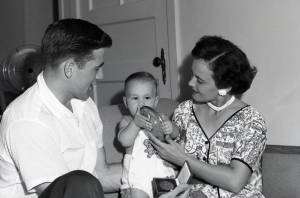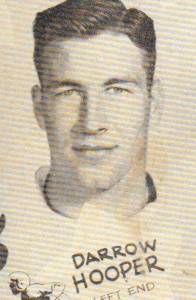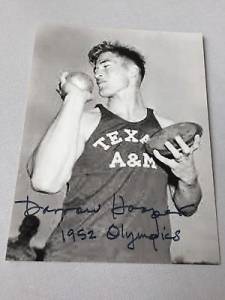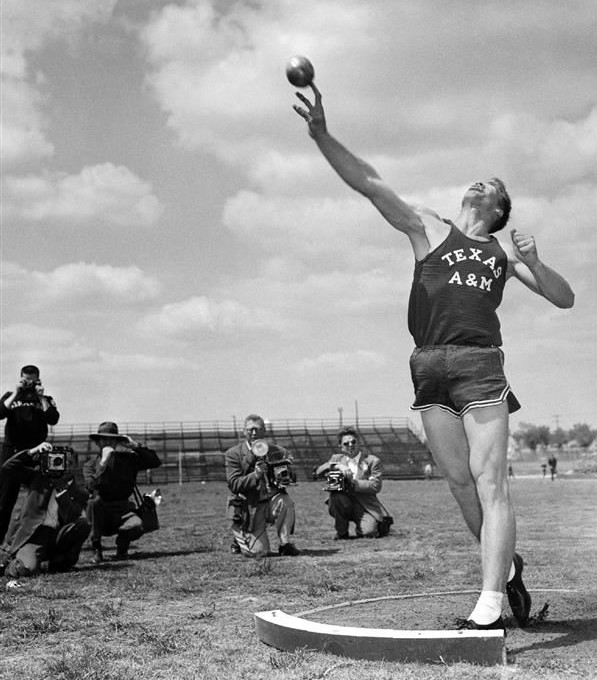Robert T. Hill Junior High School was not exactly a cornucopia of athletic talent in the 1966−67 school year, at least among the ninth graders. The Highlanders football team went 1-8, and most of its top players were eighth graders like Blake Johnson, Tommy King, Joe York, Steve Morgan and Troy McDaniel. The basketball team was better, if only due to the presence of Clarence Darrow “Dee” Hooper. Junior high school hoops would ordinarily get the scantiest attention from the Dallas Morning News and Dallas Times Herald, but an exception was made for Hooper. He sometimes scored 30 points, fairly impressive considering that the games lasted just 32 minutes. Yes, those of us at Hill were proud of this aptly named young man. Might he be the next Pete Maravich? The Pistol was then a freshman at LSU, pouring in 43 points per game—just as he would do for three varsity seasons.
Hooper, who had been a member of that woeful Hill football team, stuck to basketball when he got to Bryan Adams High School. I followed him a year later. Having made the all-sophomore “B” team, I was among his  teammates until back surgery derailed my dreams of hoops stardom. I remember Dee; he played hard, dribbled well, could drive to the basket and was deadly from outside. He was no great leaper, however. Coach Ralph Zietz was fond of him, and that can be said for me and his other teammates like Larry Hagedorn, Paul Hafner, John Groscurth, Don Chandler and Rick Morris. To the best of my knowledge, he never made all-district and did not get a scholarship to one of the Southwest Conference schools or even some lesser institution. Having peaked in junior high, he was clearly no Maravich.
teammates until back surgery derailed my dreams of hoops stardom. I remember Dee; he played hard, dribbled well, could drive to the basket and was deadly from outside. He was no great leaper, however. Coach Ralph Zietz was fond of him, and that can be said for me and his other teammates like Larry Hagedorn, Paul Hafner, John Groscurth, Don Chandler and Rick Morris. To the best of my knowledge, he never made all-district and did not get a scholarship to one of the Southwest Conference schools or even some lesser institution. Having peaked in junior high, he was clearly no Maravich.
During that time, I heard vague stories about Dee having an illustrious father. Not until much later did I realize how great his dad was. Allow me now to summarize the man’s life and career.
Born in 1932 in Fort Worth, his parents named him after Clarence Darrow, one of America’s most renowned lawyers in the early 20th century. A leading member of the ACLU, he defended Leopold and Loeb, and John Scopes in the “Scopes Monkey Trial” in Dayton, Tennessee in 1925,  badly shredding William Jennings Bryan. Always a champion of the underdog, Darrow built a solid legacy. He has been portrayed in films and plays, and is the subject of several biographies.
badly shredding William Jennings Bryan. Always a champion of the underdog, Darrow built a solid legacy. He has been portrayed in films and plays, and is the subject of several biographies.
Dee Hooper’s father excelled in football, basketball and track & field at North Side High School. Unlike his son, he thenceforth abjured basketball. He was a three-year starter for Texas A&M on the football field. That alone is worthy of note, but his fame derives from throwing the discus and shot-put. He won both events in the Texas Relays, Drake Relays, Kansas Relays, SWC and NCAA meets. This Aggie specialized further in the 1952 Olympic trials in Los Angeles by setting aside the discus. The shot-put was his métier. Hooper rose to the occasion by tossing the 16-pound ball 17.41 meters, edging Parry O’Brien and Jim Fuchs. A few weeks later in Helsinki, “The Star-Spangled Banner” was played thrice as those gentlemen stood atop the podium. The Americans swept as O’Brien took gold, Hooper silver and Fuchs bronze. I think it is worth noting that Hooper, while pretty stout himself, was smaller than the others; he  weighed 181 pounds, considerably less than O’Brien (245) and Fuchs (223). Fuchs had also won bronze at London in 1948, and O’Brien was just getting started—he would win gold again at Melbourne in 1956 and silver at Rome in 1960. (He made the 1964 American team but did not medal.)
weighed 181 pounds, considerably less than O’Brien (245) and Fuchs (223). Fuchs had also won bronze at London in 1948, and O’Brien was just getting started—he would win gold again at Melbourne in 1956 and silver at Rome in 1960. (He made the 1964 American team but did not medal.)
Hooper ended his athletic career in the Finnish capital, although he might have returned to the gridiron since the New York Giants spent a 10th round pick on him in the 1953 NFL draft. After graduating from A&M with a civil engineering degree, he joined the Air Force and became a second lieutenant. He worked for Gifford Hill and opened his own company, Hooper Engineering Laboratories, in 1977. After 22 years as his own boss, he retired to travel and take care of a brood of grandkids. He is a member of the Texas A&M Athletic Hall of Fame (1965) and Texas Sports Hall of Fame (1979), and rightfully so. Hooper, whom I would love to have met, died less than a year ago, on August 19, 2018.


16 Comments
Nice find, Richard. Never knew this. Quite an interesting history and to know a BA Coog was related to such greatness makes it that more important. Thanks for digging and sharing!
Steve, it would have been better if I’d had the cooperation of Dee Hooper. I talked to him on the phone six months ago, but he was just so “busy,” he didn’t have time to reminisce about his father.
I like to learn about stuff like this. We had a Olympian dad in our midst and I guess generally did not know it.
That’s true. Dee never did brag about his father, although he had good reason to. I wish he would have talked to me and explained what his father did to influence his athletic career (which did not go beyond high school).
Richard, you have a knack at finding these stories that are inspirational and so close to home. I wonder how A&M recruited him? Why do I ask? Well. tangentially, I am thinking about my dad who was also a great athlete and star at Garland High school circa 1936-39, playing quarterback, running back, punter, kicker , defense and captain of the team during his high school years. During his senior year, A&M recruiters came calling on my grandfather, threw an envelope on the table full of money and asked if my dad could come play at A&M.b Being a migrant farmer who needed my dad to help with the farm duties, and being narrow minded, my grandfather didn’t even open the envelope. He flatly turned down the offer, so my dad never went to college, and never played football again. I’ve wondered how much money Grandpa could have made farming compared to the wad of money that was in that envelope.
So in retrospect, I am glad that Hooper’s dad was not so inclined as my grandfather.
Thanks for the history.
Not sure how the Ags recruited Hooper, Sr. But he sure made some big contributions to the maroon and white. He should have come to Austin!
Hey Richard. David Hooper here, middle son of Darrow Hooper. My father held the high school record in the US for shot put. Could have gone to school literally anywhere, but chose to go to A&M because his brother was already at school there. My dad also kicked a field goal to beat tu in 1952 and that was his claim to fame according to him. I followed in his footsteps and became a civil engineer and bought his business in 1991. Let’s go one on one whenever you like. I played B-Team at BA in 1969-70 until I decided to be hippie. Still one.
The fact that I am a graduate of the University of Texas does not dominate my life. I might have attended another institution of higher learning after leaving BA, but it would not have been Texas A&M. This is not to say I do not respect the Aggies because in fact I do. UT and A&M have such a long and entwined history, they are almost inseparable. Let me add that I have never laughed at an “Aggie joke.” Nor have I told one, for that matter.
Some Aggies, however, seem to be stuck in perpetual adolescence when it comes to UT. You appear to be one of those pathetic individuals, with your silly attempted put-downs (“tu,” etc.). Not all are like that. I have a number of friends who attended A&M, and they are good, intelligent citizens. But I feel obliged to set losers like you straight. I urge you to grow up. That’s my advice—grow up. The hour is late, but it’s not too late.
Thanks, Richard. I guess we all knew Dee (I thought his first name was Darrell, not Darrow)-a vey nice fellow as well as a great athlete. How surprising to learn his dad was a gold medalist!
I agree that it’s an odd name, Kevin. It was Clarence Darrow’s last name, and it became these Texans’ first name. I can understand why Dee wanted to use a nickname. BTW, he won silver in Helsinki. Parry O’Brien got gold.
This is really interesting. You just don’t realize brushes with greatness sometimes!
Thanks, Kenny. As indicated above, this story would have been better if Dee had opened up and told me about his father. His wife says he is very “busy” these days.
I was Dee’s first wife. Many more followed. My memory of his Father was he sent me flowers when we got the news I wasn’t pregnant.
Vickie, that’s a very interesting comment. How many wives has Dee had? And the old man was happy that you were not preggers?
Richard, not for sure about the comment being interesting more like facetious. Just the one memory I have of the man. Looking back the flowers were quite beautiful and yes, he seemed very pleased of the fact I was without child.
I’m sorry for his families loss.
The subject of marriages maybe four
or five…but whose counting. Sometimes it takes awhile to find the One ☝️
You article was a good read.
Should have proof read my last sentence.
Your article was a good read. 🤦♀️
Add Comment